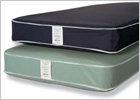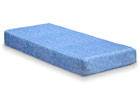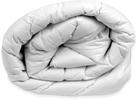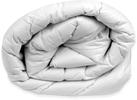Incontinence Mattress Solutions
Urinary incontinence is the unintentional passing of urine, and highlights a common problem that affects millions of people - children and adults. Although adult incontinence is more common in women than in men. It is estimated that 30 percent of females aged 30-60 are thought to suffer from it, compared to 1.5-5 percent of men.
Below are the main types of urinary incontinence and the likely causes.
Stress incontinence is usually the result of the weakening of or damage to the muscles used to prevent urination, such as the pelvic floor muscles and the urethral sphincter.
Urge incontinence is usually the result of overactivity of the detrusor muscles, which control the bladder.
Overflow incontinence is often caused by an obstruction or blockage in your bladder, which prevents it from emptying fully.
Total incontinence may be caused by a problem with the bladder from birth, a spinal injury, or a small, tunnel-like hole that can form between the bladder and a nearby area (fistula). This is usually associated with heavy nighttime incontinence, and frequent bed-wetting.
Certain things can increase the chances of urinary incontinence, including:
- pregnancy and vaginal birth
- obesity
- a family history of incontinence
- increasing age – although incontinence is not an inevitable part of ageing.
Preventing Urinary Incontinence
It's not always possible to prevent urinary incontinence, but there are some steps you can take that may help reduce the chance of it happening. These include:
- maintaining a healthy weight
- avoiding or cutting down on alcohol consumption
- staying active – getting plenty of exercise
- practicing pelvic floor exercises
- avoid bladder irritants; such as caffeine, alcohol and acidic foods
- eat more fibre, which can prevent constipation, a common cause of urinary incontinence
- stop smoking or seek help if you are a smoker
- purchasing a comfortable, easily-cleaned and breathable waterproof mattress for nighttime incontinence can increase comfort and reduce embarrassing incidents.
Lifestyle Changes
A GP may suggest you make simple changes to your lifestyle to improve your symptoms, regardless of the type of urinary incontinence you have.
For example, the GP may recommend:
- reducing your intake of caffeine, which is found in tea, coffee and cola, as caffeine can increase the amount of urine your body makes
- altering how much fluid you drink each day, as drinking too much or too little can make incontinence worse
- losing weight if you are overweight or obese
Above all remember that urinary incontinence is a common problem, affecting millions of people all over the world. Treatment, solutions and specialised products are out there.
-

2ft 6in Small Quilted Single Waterproof Mattress
£179.99 - £379.99
-

3ft Single Waterproof Mattress - Quilted
£179.99 - £379.99
-

4ft Small Double Waterproof Mattress - Quilted
£219.99 - £449.99
-

4ft 6in Double Waterproof Mattress - Quilted
£219.99 - £449.99
-

3ft Single Waterproof Mattress - Sfonia Superior Foam
£229.99 - £449.99
-

4ft 6in Double Waterproof Mattress - Sfonia Superior Foam
£299.99 - £499.99
-

2ft 6in Small Single Waterproof Mattress - Sfonia Superior Foam - Heavy Incontinence
£229.99 - £449.99
-

4ft Small Double Waterproof Mattress - Sfonia Superior Foam - Heavy Incontinence (Every Night)
£299.99 - £499.99
-

Hospital Grade Waterproof Mattress - 3ft
£269.99 - £499.99
-

Hospital Grade Waterproof Mattress - 2ft 6in Small Single
£269.99 - £499.99
-

Hospital Grade Waterproof Mattress - 4ft Small Double
£349.99 - £549.99
-

Hospital Grade Waterproof Mattress - 4ft 6in Double
£349.99 - £549.99
-

Single Size Waterproof Duvet
£39.99 - £59.99
-

Double Size Waterproof Duvet
£49.99 - £79.99
-

Breathable Waterproof Pillow
£19.99 - £29.99